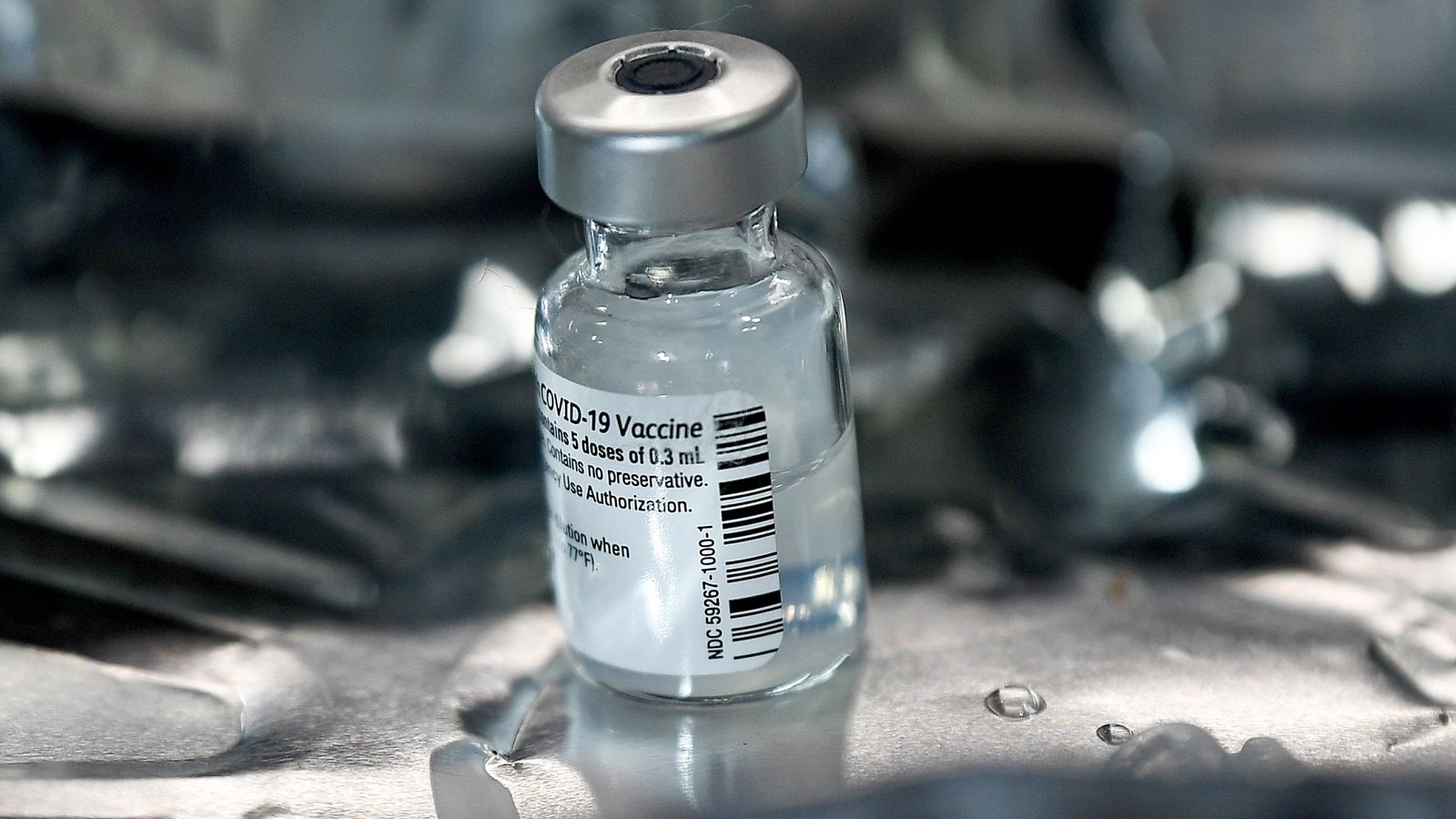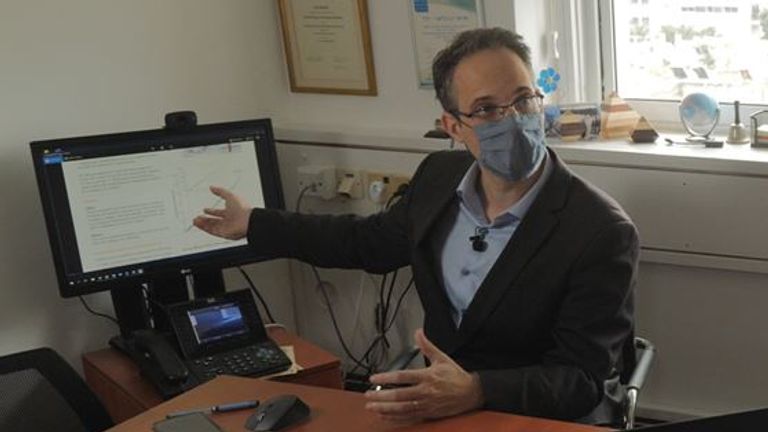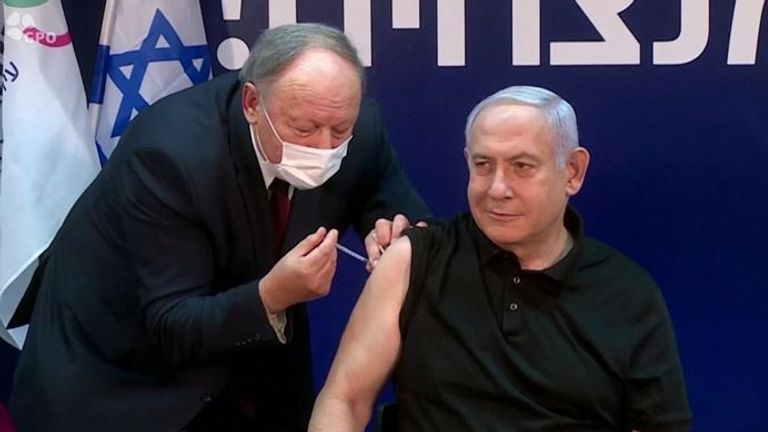The first real-world analysis of the Pfizer coronavirus vaccine suggests it is matching its performance in clinical trials, but raises serious questions about the UK’s decision to delay the second dose.
Scientists in Israel – which is leading the COVID-19 vaccination race – have told Sky News that they are “very hopeful” having studied preliminary data from 200,000 vaccinated people.
But crucially they say their results do not show efficacy at a level close to that used by the UK to justify delaying the second dose of the Pfizer jab.
Professor Balicer is a physician, epidemiologist and chief innovation officer for Clalit, the largest health care provider in Israel. He is also an adviser to the World Health Organisation.
“We compared 200,000 people above the age of 60 that were vaccinated. We took a comparison group of 200,000 people, same age, not vaccinated, that were matched to this group on various variables…” prof Balicer said.
“Then we looked to see what is the daily positivity rate… And we saw that there was no difference between vaccinated and unvaccinated until day 14 post-vaccination.
“But on day 14 post-vaccination, a drop of 33% in positivity was witnessed in the vaccinated group and not in the unvaccinated… this is really good news.”
However, UK scientists said in December that trial data had suggested it would be 89% effective after one dose.
A document issued by the UK government’s vaccine advisers, the Joint Committee on Vaccination and Immunisation, to justify delaying the second dose for up to 12 weeks said: “Using data for those cases observed between day 15 and 21, efficacy against symptomatic COVID-19 was estimated at 89%, suggesting that short term protection from dose 1 is very high from day 14 after vaccination.”
This is much more optimistic than the new real-world Israeli data suggests.
Responding to the UK government strategy, prof Balicer said: “The data and estimates I gave are what we have.
“We could not see 89% reduction in the data we reported. Further data and analyses will be released in peer reviewer scientific format.”
He added: “The practise in Israel is to provide the second vaccine at three weeks.
“And so it is impossible for us to tell what would be the impact of not providing the second dose…”
Israel is following Pfizer protocol in giving the second dose of the coronavirus vaccine three weeks after the first.
It has a smaller population and a regular supply from Pfizer. In return it’s providing detailed data to Pfizer.
In contrast, the UK with a much larger population is prioritising the first jab – arguing that one dose given to as many people as possible is better than two to fewer people.
“We have already covered some 25% of our population and over 75% above the age of 60 in the last four and a half weeks.
“And so we are one of the first countries to be able to witness the sheer impact in big numbers of vaccinating such a large proportion of the population,” prof Balicer said.
“By being able to manipulate this data in real time, to clean it and to use proper epidemiological methodology, we are able to provide answers to the most pertinent questions right now.”
The Israeli scientists believe their 33% figure will rise when data is compiled from younger age groups and the fact that the data is real-life adds to their confidence.
“This is not the ideal setting of a randomised controlled trial where everything from coaching maintenance to selection of the population of interest is done in a very meticulous way.
“This is the real-world. And so by seeing the real world impact so early on in the same direction and in the same timing as we’ve seen in the clinical trials is something that makes us very hopeful.”
Tel Aviv’s Sourasky hospital, one of hundreds of vaccination centres, is inoculating hundreds of people an hour.
Ronni Gamzu is the hospital director. He served as the government “corona tsar” – a rotating advisory role – until last month.
“I believe, truly believe, this is the beginning of the end because the vaccine creates the immune response.
“We see that clearly and we see a change in the people that are becoming severely ill with coronavirus and moderately ill. People that have got the vaccine are more protected,” professor Gamzu said.
Asked about the UK strategy of delaying the second dose, he said the 89% figure seemed “very optimistic” but understood why compromises needed to be made.
“If you are short of vaccines, this is a good idea… We believe that if you take the booster shot, even after six weeks, then you will have an effect, the effect is coming and growing gradually.
“We do not know that for sure because the studies were done for 21 days for Pfizer and 28 days for Moderna. But there is a clear logic behind postponing it when you are short on vaccines.”
In a previous statement on the decision, the JCVI said: “With most vaccines an extended interval between the prime and booster doses leads to a better immune response to the booster dose.
“There is evidence that a longer interval between the first and second doses promotes a stronger immune response with the AstraZeneca vaccine.
“There is currently no strong evidence to expect that the immune response from the Pfizer-BioNTech and AstraZeneca vaccines differ substantially from each other.
“The committee advises initially prioritising delivery of the first vaccine dose as this is highly likely to have a greater public health impact in the short term and reduce the number of preventable deaths from COVID-19.”
Sky News has contacted the JCVI for comment.






